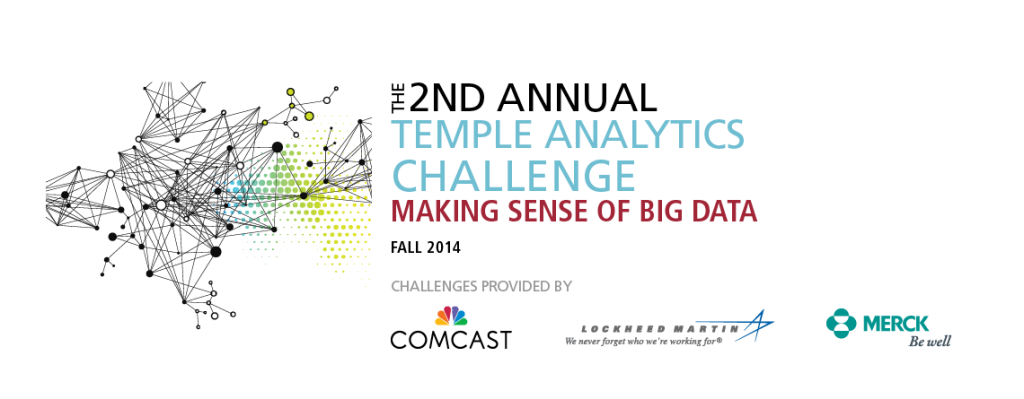 Representatives from businesses ranging from Campbell Soup Company to Merck & Co. to Genji, LLC participated in the third annual Fox School of Business’ Institute for Business and Information Technology (IBIT) career fair for different reasons, and with specific goals in mind. But, no matter why they came, they left pleased.
Representatives from businesses ranging from Campbell Soup Company to Merck & Co. to Genji, LLC participated in the third annual Fox School of Business’ Institute for Business and Information Technology (IBIT) career fair for different reasons, and with specific goals in mind. But, no matter why they came, they left pleased.
Based on a survey of the Sept. 24 event, over 80 percent were “very satisfied” with the overall career fair experience.
In today’s world it’s necessary to find candidates that are part of a great program. Almost half of the representatives surveyed said that the reputation, ranking and quality of Fox’s Management Information Systems (MIS) program was the reason they attended. Plus, many of the employers, know the program from their own time at Temple.
“It is great to see so many of the alumni come back and to hear how well they are doing.” Said Laurel Miller, IBIT Director. “The excellent alumni further increase demand for our graduates even though we regularly achieve 100% placement. This year, we had a 70% increase in the number of firms participating.”
Alumni affiliation is important but it’s the ability to meet excellent candidates face-to-face that prompts the alums to come back, and IBIT to continue putting on the event.
Chad Butler, I.T. Business Engagement Analyst, Campbell Soup Company, and a 2005 graduate said it’s increasingly important to “see them (students) with open eyes—their personality and professionalism.”
Specifically, businesses seek a match between the culture and needs of the company, and the experience and personality of the candidate in front of them. Campbell’s recently made a commitment to bring interns in, Butler said. If the internship goes well he wants to make job offers in advance of graduation.
David Glover also wants early access to great candidates. As Associate Director of MES Environments, Merck Manufacturing Division, Information Technology, Merck & Co. Inc., he works with a team of six employees- all recent Temple graduates- to make sure Merck can “find those young minds that will make our IT systems better.”
Glover describes Merck as “ever present” on campus, due to Merck’s partnership with IBIT, but the fair is a chance for Glover and his team to be “one-on-one” with students. Which, in Glover’s case, is mandatory because students don’t often think of Merck first when contemplating exciting IT internships and careers. Glover has successfully brought current students into Merck for nine to 12 week internships and started them on career paths at the company. The best potential employees are, Glover said, “excited about the prospect about saving lives with new and novel medicines.”
Genji, LLC makes sushi, not pharmaceuticals, and they are experiencing rapid growth. The company supplies Whole Foods, among others. So, a flyer about the IBIT career fair caught Alex Shi’s attention. Shi, a 2010 graduate of Temple, with a degree in MIS, is the Manager of IT and Project Manager, EPMO, for Genji. He is looking to build a team of project managers. What better place to look than his alma mater? At the career fair he met well many qualified students who, he said, had “an impressive level of enthusiasm.”
Shi’s experience reflects the survey response. The top answer to the question “what did you like the most” was “it’s focus and the quality of students.”
Shi left with about 40 resumes and planned to interview 10 people.
“I felt they were ready, they had the fundamentals down (and) understood business etiquette.” He also said that the event saved time in the recruiting process because he could “meet the people behind the resume and get a much better sense of the person.”
So, the results are in. Whether representatives were fully partnered with IBIT or alums back for a recruitment event, the career fair puts companies and candidates in a place where they can meet, and find the right match.
Learn more at: http://ibit.temple.edu/careerfair/

 Temple University’s Institute for Business and Information Technology (IBIT) has appointed Walmart executive and Temple alumnus Ben Hasan as its newest Executive-in-Residence. Hasan is Walmart’s Senior Vice President, Information Services Division. In his position, Hasan is responsible for ISD strategy, communication, innovation, architecture and vendor management.
Temple University’s Institute for Business and Information Technology (IBIT) has appointed Walmart executive and Temple alumnus Ben Hasan as its newest Executive-in-Residence. Hasan is Walmart’s Senior Vice President, Information Services Division. In his position, Hasan is responsible for ISD strategy, communication, innovation, architecture and vendor management.
 The Institute for Business and Information Technology announces the
The Institute for Business and Information Technology announces the  Atish Banerjea has just become the newest member of the
Atish Banerjea has just become the newest member of the 

